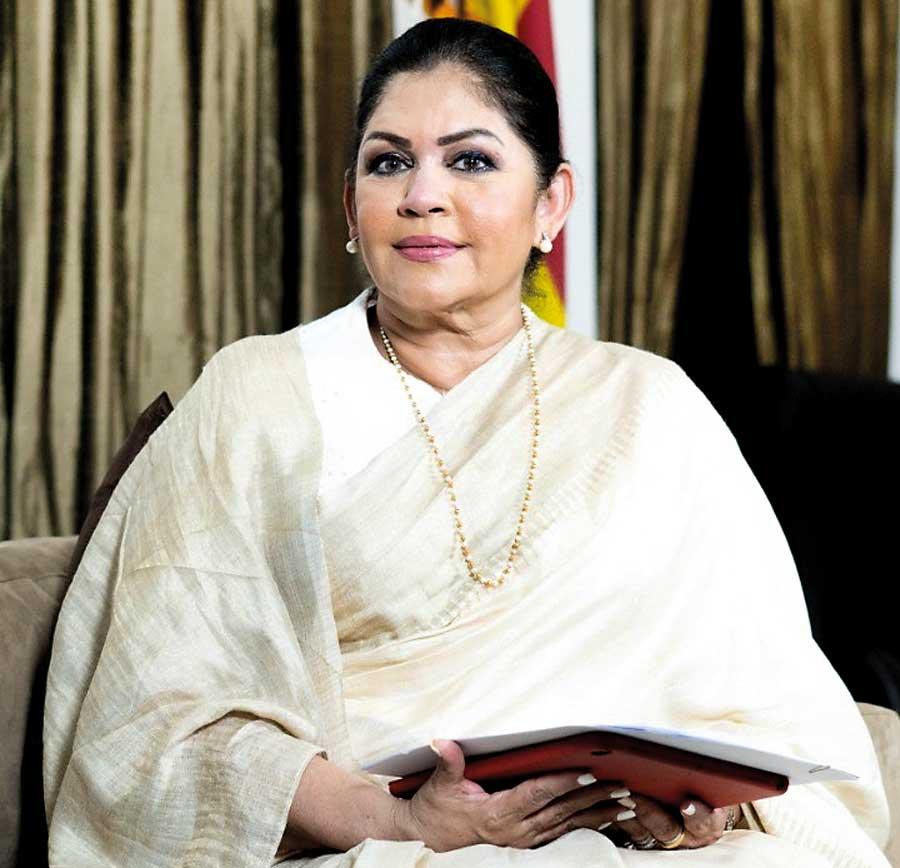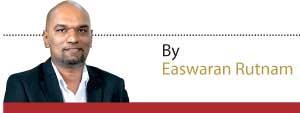30 Nov 2020 - {{hitsCtrl.values.hits}}

The second wave of the Covid 19 is taking its toll on Sri Lanka and Colombo is one of the most affected  areas. With the death toll from Colombo increasing and more people are infected, Colombo Mayor Rosy Senanayake told Daily Mirror that the public was not taking the situation seriously.
areas. With the death toll from Colombo increasing and more people are infected, Colombo Mayor Rosy Senanayake told Daily Mirror that the public was not taking the situation seriously.
In the On Fire Interview with Daily Mirror Online, the Colombo Mayor said that she was working with the authorities and in some instances working on her own to address the crisis.
Excerpts:
- Authorities should have foreseen the second wave
- Credits to Army Commander for steps taken
- Will not let political differences affect work
- Retired medical officers requested to rejoin
- It’s like a never-ending cycle where our heroes, the public health department, the doctors, the PHIs, and the relevant authorities work constantly without a break
- We need to see this flattened totally and get back to normalcy. But we will have to live with Covid
 Q Ms Senanayake how serious is the situation in Colombo?
Q Ms Senanayake how serious is the situation in Colombo?
You know, I think this is as serious as it can be. Every one of us should have this mindset or mind frame should be where we take this as a serious issue. It is serious. You can’t say it is not serious. See, when we do 991 PCR tests a day and if we have 249 positive cases, it is a serious issue.
You know, even if you have five positive cases in a city, I look at it as a serious issue. The whole problem right now is that people don’t take this seriously. When I say people, I talk about the general public as well. You know, all of us, we all think that you know, it’s not going to happen to us. It is not that serious. It is in your neighbours garden. Not in my garden. Not in my house. So you need to look at it as a very serious issue. And it is very serious, in my opinion. And the government, together with the CMC, is taking every effort to try and control. And we are in a state where we have come to a controlling level where we don’t see an increase, but it’s static, but it hasn’t also gone down at the same time. And there are areas like in pockets where we are getting the positive cases. So the CMC does an X number of testing, then the private sector also does PCR testing and then there are positive numbers there as well.
So, I think every one of us should have this mindset to know that Covid-19 is a pandemic, and it’s a very serious issue. And with that seriousness in mind, if we adhere to all the norms and go about our day to day work, I mean, I see day to day some people just walk about unnecessarily.
"Don’t get out of your house if you don’t have to get out of your house. If you can use e-commerce to support you with, you know, your daily essentials and whatever, do that. Constantly think that the person that you come in contact with could be a Covid positive patient. Wear your mask, ensure 1-meter distancing, sanitizing, hand washing"
Don’t get out of your house if you don’t have to get out of your house. If you can use e-commerce to support you with, you know, your daily essentials and whatever, do that. Constantly think that the person that you come in contact with could be a Covid positive patient. Wear your mask, ensure 1-metre distancing, sanitizing, hand washing.
All this is important. Also, when you are at home, you know, we have all kinds of indigenous remedies that we can take from drinking kothamalli to drinking hot water to steam inhalation. So this is how serious it is to me because none of us wants to get Covid. We don’t want our family members, elderly family members dying of Covid. So let’s look at it as a very serious issue.
Q But do you think, maybe after the first wave the authorities became complacent and let the people do what they want to do and that resulted in the situation we are facing right now?
So, you know, in the first wave, I think the government handled the situation very well, extremely well. There was a curfew and a lockdown which helped us to open up later and also go for an election. For almost three months we were Covid free. But with the Brandix cluster, it started spreading all over. And now it’s in Colombo. Colombo is in a bit of a serious situation, but I must say at the public health department has been able to contain and control it to a certain extent, but it could be only controlled with the support of the people as well. So at that point, yes, I think the government took very clear good measures initially. For example, I always give credit to the Commander of the Army because he foresaw the issue and he went and he started setting up quarantine centres. They set up prefabricated quarantine centres, they found places, they gave army locations for anyone who came from overseas to be quarantined.
So even at this point, when we find any positive cases we take them to the quarantine centres in the night. Our doctors are on the ball in the morning. They wake up at 5 o’clock. They start testing in the morning. And when the reports come they identity the people, get the buses with the support of the central government and put them into the buses and send them to the relevant quarantine centres. And then with the support of the Army, again, we do the contact tracing of the previous day’s positive cases and then get ready for the next day.
So it’s like a never-ending cycle where our heroes, the public health department, the doctors, the PHIs, and the relevant authorities work constantly without a break. They work very hard. So to come to your question about whether the government let it go. You know, I don’t want to criticize somebody for the sake of criticizing.
Q The reason I raised that questions are because the authorities or the government is blaming the public. But shouldn’t the government also take part of the blame?
I think we all need to take responsibility, but the government has to take the major share of the responsibility. So do we. Because we should have foreseen the second wave and we should have been ready for it. And in case of a second wave, where are we going to keep these people? How soon can we test them? How much testing can we do for a day now?
I had requested about two weeks ago for two weeks, total lockdown or maximum of three weeks. And then do the maximum number of PCR testing and identify the positive cases. When I say lockdown, I mean a strict lockdown where people should have no movement unless it is for essential goods and essential services. No one to come in, no one to go out.
"Our doctors are on the ball in the morning. They wake up at 5 o’clock. They start testing in the morning. And when the reports come they identity the people, get the buses with the support of the central government and put them into the buses and send them to the relevant quarantine centres. And then with the support of the Army, again, we do the contact tracing of the previous day’s positive cases and then get ready for the next day"
I must say the government supported me where apart from a lockdown in some areas, in certain police divisions they put curfew and they went into a very strict lockdown where people couldn’t come out. They also used drones to identify people who were roaming around.
Only thing is, for me, the testing that we do is not sufficient. But I am no medical person. I’m not an authority in that sense. I’m talking to you as a layperson, but as the Mayor, as the commander in chief of the Commission and the Mayor appointed by the public. Because it’s my responsibility to make sure that the people of the Colombo Municipal limits are safe, secure, and are provided with the necessary services.
I look at it as a humanitarian crisis that we are faced with. Because 60 per cent of the people who live in Colombo are underserved, they are the low-income groups and most of them live on daily wages or they have their self-employment schemes and whatever. So all this has gone in the last three to four weeks. So we need to support them. We need to provide them with their basic needs. So what I said was to provide their basic needs and do a full lockdown with maximum testing for a day. Because the maximum we have done for a day is 1500 on certain days.
We depend on the central government to give us the PCR packs to do the testing and then we have to send it to the government labs. So this is something that the government could have been ready with, in case of a second wave, which we are faced with right now. Other than that, this pandemic is new to everyone. No amount of preparing yourself sometimes can help us. So we will learn by trial and error. But that is no excuse. So I suppose everybody’s going with trial and error, but there is no excuse because we could also look at how other countries are working with it. New Zealand, Taiwan, Taipei or perhaps the Nordic countries and some of the countries that are, you know, doing extremely well. And the strategies they formulated are some things that we should have looked at and been prepared for. But we were very complacent and content. But I think we are managing and coping well at this point. But we can still do better.
Q You mentioned the role played by the military. Concerns are being raised that this whole process is being militarized. How do you see that?
You know, I am detached from the central government’s operations. My entire concentration is on the municipal limits. I must say, I have immense support from the military. I must mention the present Commander of the Army, Lieutenant General Shavendra Silva has supported us. We do appreciate his time. The Commander has totally supported us. At this point of time, I am distributing 70,000 dry ration packs to 70,000 families and it’s done in pockets with the support of the military.
Q So, basically you are collaborating with the military.
Obviously, you know, we cannot survive without the central government. As I said, the health ministry has to give us the PCR test kits. They have to do tests in their labs. But all the work is done by our public health department. I must actually commend Dr Wijeyamuni, Dr Guruge and that entire team.
I have 25 doctors, 65 PHIs in the public health department itself. We have about 600 people working there, all on the ground. They are stretched. They do the maximum and they are overwhelmed with the responsibility, the work that they’re doing for the nation. And I must say, they are also exhausted. So as a result of that, I have taken measures to bring back the retired PHIs and any medical person who wants to come back and serve us. We have also spoken to the Medical Faculty to get some interns to support us. Also just passed our medical students. So these are measures that we’ve taken as a concept to get more human resources, manpower, and do more testing.
Q You said maybe there were some shortcomings after the first wave. Are we now prepared to face the third wave?
I think if you talk to the medical authorities, they might say that they are prepared. But I have my concerns. Those are my personal concerns, like, you know, whether we have enough number of hospitals in case there is a third wave. Even now, I think, you know, we are stretched to the maximum.
Whether we have enough ventilators, whether we have lab facilities to do more PCR testing. To curb or flatten the curve, we need to do PCR testing, identify the positive cases and quarantine. That is like a must. If we do at least 100 or 200 random testings, sometimes we might find people who are not contacts of a patient. We might be able to identify people faster and send them to quarantine.
I have offered my community centres to be used as quarantine centres. We have two clinics which we have offered. We have hospitals which we have offered. We have 27 dispensaries and we’ve been given free medication so far. And we also have mobile clinics right now, which we operate those lockdown areas.
"I have 25 doctors, 65 PHIs in the public health department itself. We have about 600 people working there, all on the ground. They are stretched. They do the maximum and they are overwhelmed with the responsibility, the work that they’re doing for the nation. And I must say, they also exhausted"
I have appealed to the private sector and some of those corporations and banks and people have been very positive in extending support. This is a humanitarian issue and we are dealing with human lives and we are dealing with a very deadly pandemic which is affecting the government, the municipality, the private sector, the businesses, the economy. So we need to see this flattened totally and get back to normalcy. But we will have to live with Covid. So we need to adhere to the health regulations and norms in everything we do and take it as a very serious issue. Do not take it lightly.
Q Has politics in any way affected your ability to work with the government since you are from a different political party?
Not really. My approach is different from how I work. If you take the pandemic we should not look at party politics and nobody should be looking at who is doing what. We should not criticize for the sake of criticizing unless there is something constructive that we can contribute towards supporting the system. This is beyond party politics. This is beyond race, religion, caste, creed, the whole issue. This is a human issue where we are dealing with human lives and their safety. Where we are dealing with the future of our future generations.
Q What are the authorities doing to assure people? Because they have legitimate concerns.
This is not my responsibility is the responsibility of the government. But I’m doing my bit as the Mayor of Colombo.
I am doing my bit through the council. We have limitations, I must say. But my charity department is working tirelessly. I have relief officers on the ground. We haven’t looked at party politics or anything like that. We are only looking at how we feed the people, how do we take care of their needs, what medication do we need to give them? What are the things that we could do to support them? Apart from doing all the other development programmes, everybody is working in harmony.
22 Nov 2024 1 hours ago
22 Nov 2024 2 hours ago
22 Nov 2024 2 hours ago
22 Nov 2024 3 hours ago
22 Nov 2024 3 hours ago